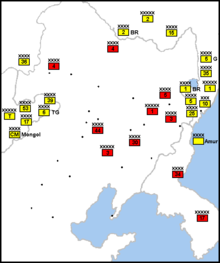Forty-Fourth Army (Japan)
| Japanese Fortieth-Fourth Army | |
|---|---|
 Position of the 44th Army in 1945 | |
| Active | January 12, 1945 – August 15, 1945 |
| Country | Empire of Japan |
| Branch | Imperial Japanese Army |
| Type | Infantry |
| Role | Corps |
| Garrison/HQ | Mukden, Manchukuo |
| Nickname(s) | Ensei (遠征, expeditionary) |
| Engagements | Soviet invasion of Manchuria |
The Japanese 44th Army (第44軍, Dai-yonjyū yon gun) was an army of the Imperial Japanese Army during the final stages of World War II.
History
[edit]The Japanese 44th Army was initially raised in July 1941 as the Kwangtung Defense Army (関東防衛軍, Kanto boei gun), an auxiliary force of the Kwantung Army based in the Manchukuo capital of Xinjing for public security and training. As the war situation on the Pacific front grew increasingly desperate for Japan, the Imperial Japanese Army transferred more and more experienced divisions and their equipment out of Manchukuo to other fronts. By early 1945, the vaunted Kwantung Army was largely hollowed out, and indications of a buildup of Soviet Red Army forces on the borders on Mengjiang and Manchukuo were alarming. The Kwantung Defense Army was renamed the Japanese 44th Army on May 30, 1945 and assigned to the Japanese Third Area Army, based in southern Manchukuo. It saw combat against the Soviet Army in Soviet invasion of Manchuria, with combat operations continuing into September, even after the official surrender of Japan. It was officially disbanded at Mukden, with many of its surviving troops becoming Japanese prisoners of war in the Soviet Union.
List of Commanders
[edit]Commanding Officer
[edit]| Name | From | To | |
|---|---|---|---|
| 1 | General Tomoyuki Yamashita | 17 July 1941 | 6 November 1941 |
| 2 | Lieutenant General Tatsumi Kusaba | 6 November 1941 | 21 December 1942 |
| 3 | Lieutenant General Satoshi Kinoshita | 21 December 1942 | 7 December 1943 |
| 4 | Lieutenant General Shin Yoshida[1][2][3] | 7 December 1943 | 1 March 1945 |
| 5 | Lieutenant General Yoshio Hongo[4] | 1 March 1945 | September 1945 |
Chief of Staff
[edit]| Name | From | To | |
|---|---|---|---|
| 1 | Lieutenant General Yasunori Yoshioka | 17 July 1941 | 1 July 1942 |
| 2 | Major General Senichi Tasaka | 1 July 1942 | 16 May 1944 |
| 3 | Major General Hiroshi Tamura | 16 May 1944 | 2 October 1944 |
| 4 | Major General Nobuyoshi Obata | 2 October 1944 | September 1945 |
References
[edit]- ^ Yoshio Hongo (see below) was married to Shin Yoshida's wife's aunt. Source: Reiko Sugita, living descendant.
- ^ Lieutenant General Shin Yoshida commanded the "Mechanized Army" with headquarters at Ssupingchieh, starting on July 4, 1942 or possibly as early as April 1941. http://www.tanks-encyclopedia.com/ww2/jap/ww2_IJN_Tanks.php.
- ^ Yoshida became President of Manchuria Telecommunication and Telephone after retiring from the army after this posting. Source: http://www.tanks-encyclopedia.com/ww2/jap/ww2_IJN_Tanks.php
- ^ Yoshio Hongo (see above) was married to Shin Yoshida's wife's aunt. Source: Reiko Sugita, living descendant.
Sources
[edit]- Frank, Richard B (1999). Downfall: The End of the Imperial Japanese Empire. New York: Random House. ISBN 0-679-41424-X.
- Jowett, Bernard (1999). The Japanese Army 1931–45 (Volume 2, 1942–45). Osprey Publishing. ISBN 1-84176-354-3.
- Madej, Victor (1981). Japanese Armed Forces Order of Battle, 1937–1945. Game Publishing Company. ASIN: B000L4CYWW.
- Marston, Daniel (2005). The Pacific War Companion: From Pearl Harbor to Hiroshima. Osprey Publishing. ISBN 1-84176-882-0.
- Glantz, David (2003). The Soviet Strategic Offensive in Manchuria, 1945 (Cass Series on Soviet (Russian) Military Experience, 7). Routledge. ISBN 0-7146-5279-2.
External links
[edit]- Wendel, Marcus. "Axis History Factbook". Kwantung Defence Army.
- Wendel, Marcus. "Axis History Factbook". Japanese 44th Army.
